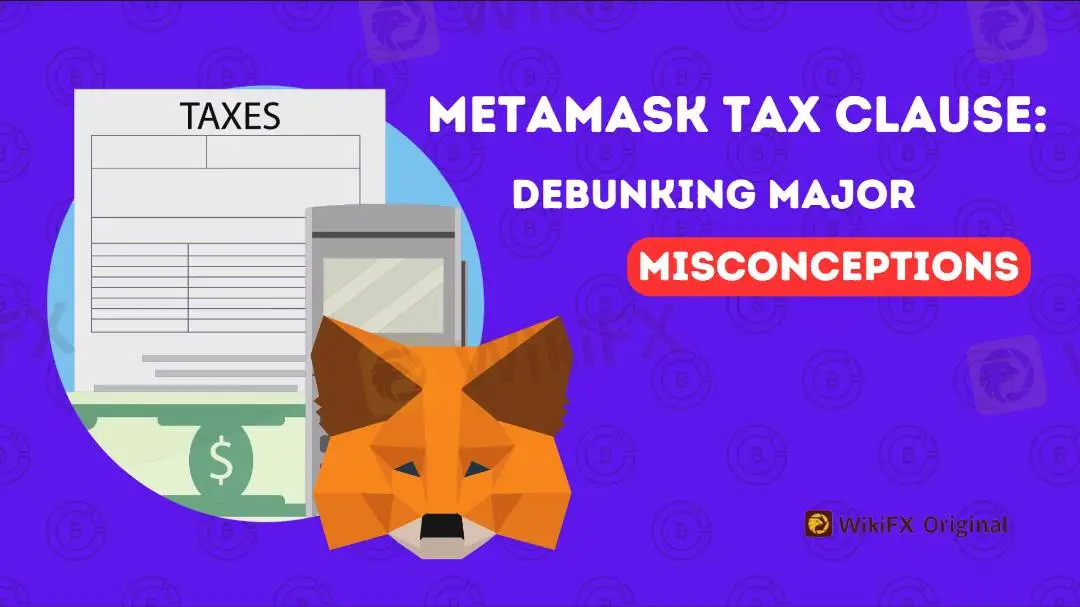简体中文
繁體中文
English
Pусский
日本語
ภาษาไทย
Tiếng Việt
Bahasa Indonesia
Español
हिन्दी
Filippiiniläinen
Français
Deutsch
Português
Türkçe
한국어
العربية
MetaMask Tax Clause: Debunking Major Misconceptions
Abstract:Accointing has recently provided valuable insights regarding MetaMask's tax policies, addressing the confusion among its users.

In response to the recent controversy surrounding MetaMask's updated terms of service and its tax clause, a recent update has been issued to clarify several misconceptions. Accointing, a leading crypto portfolio tracking firm, took to Twitter to shed light on the situation, emphasizing that the MetaMask tax clause specifically pertains to users who make purchases of products or services through the wallet service provider.

To clarify further, individuals who utilize MetaMask solely as a cryptocurrency wallet or for non-commercial purposes, without engaging in any transactions related to purchasing goods or services through the wallet, will not be subject to the taxes outlined in the tax clause.
Accointing also clarified that the tax mentioned in the clause does not pertain to customers' capital gains tax. Instead, it applies to taxes associated with the sale of services conducted between MetaMask users and the wallet provider, typically paid by the party responsible for collecting the tax.
In essence, the statement indicates that the obligation of paying these taxes lies with the entity responsible for collecting them. It implies that MetaMask, being the service provider facilitating the sales of services on its platform, would assume the responsibility of managing and fulfilling the tax payment associated with these transactions.
Various Aspects of Crypto Tax Policies
Tax authorities generally classify certain events as taxable, including the conversion or sale of cryptocurrencies into fiat currency or other digital assets. In some jurisdictions, receiving cryptocurrencies as payment for goods or services may also be considered a taxable event.
Furthermore, the profits or gains obtained from selling or exchanging cryptocurrencies in specific jurisdictions are typically subject to capital gains tax. The tax liability is generally determined based on the discrepancy between the acquisition cost and the proceeds from the sale.
As an example, the 2023 budget proposal in Italy includes a provision that suggests a 26% tax on capital gains derived from cryptocurrency trading. However, this tax would only be applicable if the profits from cryptocurrency exceed 2,000 euros.
Additionally, tax considerations may also arise from crypto mining and staking activities. In certain jurisdictions, the value of newly created or staked coins is considered as income and is therefore subject to taxation. Notably, the White House is urging Congress to include a 30% tax on the electricity costs associated with cryptocurrency mining in the upcoming federal budget.

Disclaimer:
The views in this article only represent the author's personal views, and do not constitute investment advice on this platform. This platform does not guarantee the accuracy, completeness and timeliness of the information in the article, and will not be liable for any loss caused by the use of or reliance on the information in the article.
Read more

Russia to Fully Ban Crypto Mining in 10 Regions Starting January 1, 2025
Starting from January 1, 2025, Russia will implement a comprehensive ban on cryptocurrency mining in 10 regions for a period of six years. The ban will remain in effect until March 15, 2031.

Malaysia’s Crypto Landscape: Adapting Amidst Global Ambitions
The United States is intensifying its efforts to become a global cryptocurrency hub under President-elect Donald Trump. Experts believe this move could prompt countries, including Malaysia, to reassess their regulatory approaches toward digital assets.

SEC Approves Hashdex and Franklin Crypto ETFs on Nasdaq
The SEC has approved crypto index ETFs by Hashdex and Franklin Templeton, including Bitcoin and Ethereum, marking a milestone in crypto asset investment.

North Korean Hackers Steal $1.3bn in Cryptocurrency in 2024
Over $2.2bn in cryptocurrency stolen in 2024, with North Korean hackers accounting for $1.3bn. Discover how cyber theft impacts the evolving crypto landscape.
WikiFX Broker
Latest News
ASIC Sues Binance Australia Derivatives for Misclassifying Retail Clients
WikiFX Review: Is FxPro Reliable?
Malaysian-Thai Fraud Syndicate Dismantled, Millions in Losses Reported
Trading frauds topped the list of scams in India- Report Reveals
AIMS Broker Review
The Hidden Checklist: Five Unconventional Steps to Vet Your Broker
Russia to Fully Ban Crypto Mining in 10 Regions Starting January 1, 2025
YAMARKETS' Jingle Bells Christmas Offer!
Why is there so much exposure against PrimeX Capital?
Doo Financial Expands Regulatory Reach with Offshore Licenses in BVI and Cayman Islands
Currency Calculator


